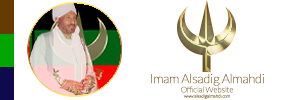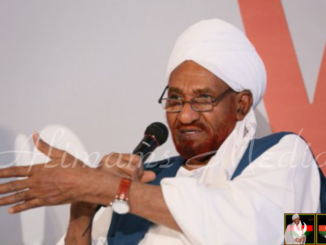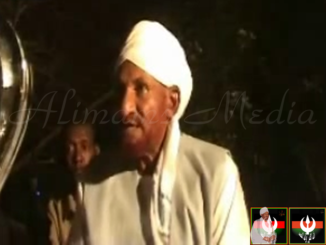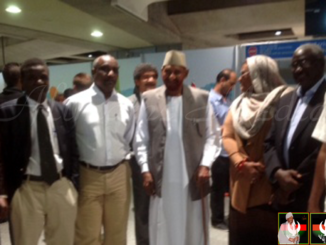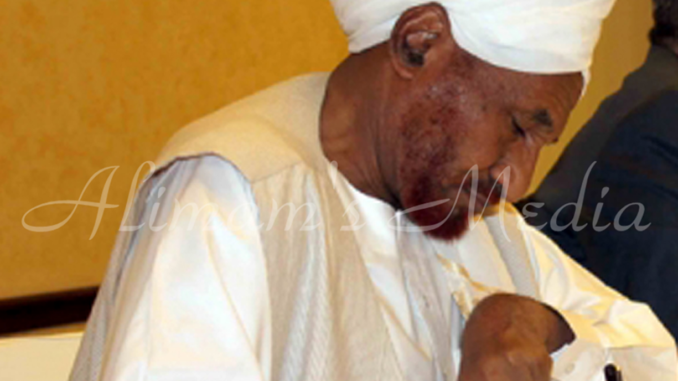
alhabeeb alimam alsadig almahdi Arab-Revolutions-and-the-Reshaping-of-International-Relations
Arab Revolutions
and the Reshaping of International Relations
By: Al Imam Al Sadig Al Mahdi
5th April, 2011
Contents
lntroduction……………………………………………………………………………………………… 2
First Point: What Happened in MENA?………………………………………………………. 3
Second Point: Tunisia, Egypt and the rest: ………………………………………………….. 5
Third Point: Threats:…………………………………………………………………………………. 6
Fourth Point: The lslamic File:……………………………………………………………………. 6
Fifth Point: Required Aspects of Change:……………………………………………………… 7
Sixth Point: Club De Madrid and the Arabic Dawn………………………………………… 8
Introduction
The Arab World has for several reasons; mostly self-inflicted, succumbed to despotism even before the humiliation of foreign domination. Intellectually there was a clampdown upon rational thought. AlGhazali[1], all but tore down the culture of rational thinking initiated by Moslem Philosophers from Alkindi[2] to Ibn Rushd[3].
The same reactionary trend was effected in the field of theology and jurisprudence, where the more open minded elucidations of Abu Hanifah[4] were replaced by the more restrictive approaches of Ibn Hanbal[5].
Such trends were encouraged by a political system, which climbed down from the politically sharing society of early Islam to the monolithic system initiated by Ibn Aby Sufian[6] – the first Ummayad Monarch. This system had more to do with preceding Byzantine and Persian Sassanid political systems, than with anything advocated by Islam. In fact, in the words of Ibn Hijr Al Askalani: Scholars are unanimous that people are obliged to obey anyone who establishes power de facto.
Political stagnation led to economic social, intellectual and cultural stagnation and the prevalence of a socially polarized society. Therefore, the Region was, in the words of Malik Bin Nabi, prepared for Imperial domination.
Consequently, it was conquered, and its destiny shaped by foreign occupation. By the end of the First Atlantic War, nearly all Arab Regions fell under European powers.
As independent states, Arab countries have acquired Regimes of Absolute Monarchy and in other cases Liberal Democratic Regimes. The latter fell one by one to military dictatorships. Consequently, the Arab Region became the most democracy deficient Region in the World. A phenomenon lime high by the UNDP Arab Human Development Report of 2002.
In the following points I shall analyze and describe the current phenomenon of Arab democratic revolutions, outline their consequences for the peoples of the Region, their significance for International, especially Western, relations and their consequences for Peace and Stability in the Middle East and North Africa (MENA):
First Point: What Happened in MENA?
The MENA area is not like any Region in the World. President Eisenhower described it as the most valuable piece of real estate in the World. Many people refer to Arab exceptionalism in terms of the democracy deficit. However, there are many other aspects to it; namely:
- A charismatic rich history, which makes the area successor to a historic relationship of contact, coexistence and conflict with the West.
- The presence of most valuable natural resources, particularly oil, a necessary fuel for modern industry and military hardware.
- A geopolitical crossroads between Europe, Asia and Africa; which gave the Region a special status as an International crossroads.
- The Region contains the sacred sanctuaries of the three Abrahamic Religions, whose followers worldwide have Religious interests in the Region.
- The creation of the State of Israel in a country –Palestine- without the consent of its citizens, and in defiance of all the neighboring countries, and thus creating conditions for continuous war.
Therefore, there is no other Region in the World, which has endured an intense and sustained intervention from the West as that of the Middle East.
The USA being the sole mega power after the end of the cold war, dominated that intervention for most of the time before and after the fall of the Berlin Wall. Most of the ruling families, and the one man rule Republican Regimes, solicited and obtained American support, so that in the eyes of many peoples in the Region they appeared as more concerned with the protection of American than National interests.
Several political forces: democratic, liberal, socialist and nationalist attempted to mobilize public opinion against these Regimes. Although they have succeeded in creating a widespread rejection of the despotic Regimes, they were often penetrated and hamstrung in more ways than one. More effective opposition, therefore, was articulated by Islamic forces, civilian Islamists and militant Islamicists. This phenomenon played into the hands of the Regimes, because they could muster internal support by claiming that the only alternative to them were forces, which were inherently undemocratic, so that any potential change will be for the worse. This argument paid great dividends with the International Community, especially, the American administrations. It seemed that the Region’s dictators after having protected themselves with orbits of security organizations, and used some of them to penetrate the sources of potential opposition, in the political parties, and the trade unions to ensure their total ineffectiveness, have concluded that their Regimes have become unassailable from internal dissent. Against external pressures they have shielded themselves with the “Islamic” scare crows to act as an immunity system. So self-confident have they become, that they set upon plans of dynastic succession against all the revolutionary rhetoric, which was the basis of their legitimacy in the first place.
The economic factor: unprecedented corruption by the presidents and leaders of the regimes and the ruling parties and their families, wasted many of the resources that could have lessened deterioration in Peoples’ living standards. Those Regimes were so confident that they didn’t bother to cover-up their corruption.
The new generation of angry youths and the modern techniques of communication and coordination through the mobile phones, the electronic mail, the face-book and twitter, fell outside their radar screens. That was their Achilles’ heel, which upset the cart. They thought so little of the youths’ designs that when asked what will they do about their sit-ins, some responded by saying that they will send them sweets to enjoy their picnic! Or that they will ask their parents to call them home!
The two ignition incidents of Mohammed Boazzizi (Tunisia) and Khalid Saeed (Egypt) would not have led to the massive responses, which followed, hadn’t it been for the fact that for the last ten years, at least, stability in the different Arab countries was deceptive.
It was obvious that poets, novelists, films, plays and the discourses of analytical thinkers were engaged in a campaign to chip away at the legitimacy of the Regimes. A novelist by the name of Mohammed Salawi actually published a novel two months before the January 25th revolution in Egypt titled “The Wing of the Butterfly” which anticipated the January events in fiction. There were also records of the color revolutions which took place a decade ago in Georgia and the Ukraine. They failed to warn the complacent dictators.
Second Point: Tunisia, Egypt and the rest:
Both in Tunisia and Egypt, the Revolutions succeeded in toppling the dictators because the fact that the dictators have lost legitimacy as indicated by the massive demonstrations persuaded the armed forces to measure their responses, and in good time to oust the ruling dictator. Normally, a Revolution would have its cadres to lead and its program to apply. The two successful revolutions had neither. They mobilized their countries for Revolution; they toppled the despots, but made no preparations for the alternative.
So those who moved to take office were officials with pre-revolution credentials. They are not revolutionary; they cannot claim any democratic credentials. They could only govern in terms of the existing institutions. Both in Tunisia and Egypt the post Revolution rulers will abide by the existing constitutions, and proceed to hold elections with as little amendments as possible.
The gap between those who aspire for revolutionary change and those who will carry on business as usual with little changes to accommodate the new realities is wide. It came to the open in the different attitudes to the Referendum on the constitutional amendments in Egypt. Therefore, in the political field there will be a gap between those who espouse revolutionary means, and reformists, a generation gap and a difference between those who want to uproot the ancient regime and those who would apply legal procedures.
The upheavals in Tunisia and Egypt have warned the next pieces in the domino to put up some resistance, but it seems to me that the conclusions drawn by the Club of Madrid teams which toured six Arab countries between 2002-2008 are valid: that there is a democracy deficit in the Arab World, and that the situation is inherently unstable, and that the inevitable future is for Arab Republics to democratize and for Kingdoms to evolve into constitutional Monarchies. Some will put up some resistance, but the writing is already on the wall: legitimacy is contingent upon democratization. Towards that end the Arab youths have discovered a new technique. They have also discovered that mass sit-ins and demonstrations provide a Human shield, and that free satellite channels reporting deprived despots of their time honored weapon of cover-up. To complete the deterrence, the development of International Humanitarian Law in terms of the ICC and the (R2P) are welcome instruments in the containment of dictatorship.
Third Point: Threats:
Although the political aspect of the changes will be faced with the troubles already mentioned, as long as freedom prevails things will sort themselves out hopefully a synthesis between Revolution and Reform until a democratic political system is established as the only means by which populations, which have been governed by anachronistic Regimes join the ascendant march of history. However, there are so many socio-economic problems which will assert themselves in the open climate of freedom. Unless the new government delivers in terms of trade unionist demands, poverty elimination, unemployment reduction and so on pressures will mount for an economic revolution. There are many types of dangers which may set back the democratic clock; namely:
- The possibility that because the body politic is not sufficiently geared for the change, elements of the old Regime may bounce back through the mechanism of democratic system itself as what happened in the Ukraine.
- The possibility that chaotic and conflicting agendas create instability which may push the military to step in to uphold Law and Order.
- The possibility that more organized segments of the community amass disproportionate power and exercise it in an exclusivist manner, thereby eschewing National unity.
All these dangers are present. They are part of the teething troubles of freedom. Therefore some of us in the Arab Democracy Foundation and the Arab Democracy Networks will analyze the situations and seek to advise the stakeholders to make every effort to succeed in the process of Democratic Transformation.
Fourth Point: The Islamic File:
Several factors in the World today have managed to forge a common minded Islamic Ummah than any other factor. When communities feel under threat they seek to forge common ground against others. This is the context in which to comprehend the current surge in Islamic identity. Half a century ago, it was Arab Nationalism as the rallying force. Consequently, Islam today is the most politically self-conscious culture in the World. It is vibrant in National politics everywhere in Muslim countries, it is vibrant in the activity of Muslim minorities worldwide. The climate of freedom is actually favoring Islam in asserting itself in National politics, and advancing the interests of Muslim minorities in other countries. However, all this would be squandered if Islamic assertion fails to accommodate the conditions of modernization, the requirements of plurality, the rights of citizenship, and the charter of universal Human Rights.
Mindful of the high cultural ground, which Islam occupies in the World stage and the high political position it is bound to achieve in the National politics of democracy, our organization called the International Forum for a Comprehensive Islamic Agenda held a conference on 16th March this year in Cairo. The gathering included a broad spectrum of Muslim groups. The conference was the first to be held in Cairo after the 25th January Revolution.
I expected the conference to be an arena for a zero sum duel between Reform and Reaction. I was pleasantly surprised to find that all present have endorsed a Reformist program, which should:
- Avoid the Taliban Agenda of Islam against modernization.
- Avoid the Iran Agenda of Power to the Theologian.
- Avoid the Sudan Agenda of Islam by coup d’etat, and an Islamic program, which is poised against citizen Rights, freedom and justice.
The outcome of current deliberations in such Islamic circles is to provide Islamic activists with an Islamic charter, which will express Islamic identity in terms which endorse the Comprehensive Agenda.
Fifth Point: Required Aspects of Change:
The despotic Regimes in the Arab World have been a type of internal occupation. They are bound to be removed as inevitably as their foreign predecessors. However, it is not only democratization that is in the minds of Revolutionary Arab opinion. Four aspects must inevitably change to satisfy Peoples aspirations, namely:
- A new relationship between peoples and their Government based upon participation, accountability, transparency and the rule of law.
- A credible program for economic development with a social justice Agenda.
- A new basis for International Relations on a co-equal basis.
- A review of the ME peace process to realize Peace with Justice.
Whoever will be elected to Power, they must deliver on these four items or else the weapons of Peoples Power will be directed against them.
Sixth Point: Club De Madrid and the Arabic Dawn
As I have explained, many non- governmental organizations and groups are mobilized to help the democratization process, and to throw light upon how to articulate the comprehensive Islamic Agenda: Comprehensive meaning an enlightened reading of the Holly texts, and the will to accommodate modern internal and external reality. So far so good for these organizations, but what role is there for the Club of Madrid?
The Club of Madrid has already invested much in effort to advance the cause of shared societies in the Middle East. It should now more than ever seek to advance the cause of democracy as a goal in itself, but also because of highly valuable strategic effects. I have wondered why many would be extremists turned coat and now speak with moderation? I have come to the conclusion that extremism is a function of desperation. When the extremists saw that soft power works, as in the velvet Revolutions, they revalued the process and appreciated it. The logic of all this means that if the democratic transformation delivers, it is bound to dry the pond of extremism and violence. Consequently, if it fails, it is bound to give solace to the extremists; that theirs is the only way. The RAND group conducted a study “How Terrorist Groups End?” They studied 648 such movements between the years 1968 and 2008. The conclusion is that transition to the political process is the most common way in which terrorist groups ended.
I suggest a two point Agenda for the Club of Madrid to invest in the process of a new dawn in the Arab World:
Number One: Help Ending Polarization:
Although democratic transformation is inevitable, some countries are now locked up in a cul-de-sac. We should try to see how to help the situations in Yemen, Syria, Bahrain, and indeed all polarized situations find a negotiated way-out towards a peaceful democratization process. A disinterested but democratically motivated third party may be able to help end the zero sum polarization.
The situation in Libya is a special case because of Security Council and NATO involvement.
It seems that NATO has no exit strategy and no political program. There seems to be no quick military resolution. NATO’s role is already being questioned. We can engage in a prompt action to explore the possibility of achieving total ceasefire and the establishment of a transitional government, plus a peaceful way-out for Gaddafi. If things continue as at present, the consequences may be the great loss of civilian lives, the break-up of the country and a continuous civil war.
Number Two: New Basis for Western Relations:
A new basis for Western relations with the Arab World should involve:
- An end to USA support for despotic regimes.
- Withdrawal of US troops from Muslim territories.
- Acceptance of the democratic verdict in every case as long as the participants acknowledge the principles of the Democratic process.
- An end to the blind support for The structure of the current Peace Process is lop-sided. Israel was created by UN Resolution 181. There is no common ground between the two peoples, and leaving the matter in their hands only means continuous warfare. The International Community as led by USA has created this anomaly, they are duty bound to resolve it. The Arabs had no hand in Anti-Semitism, nor in the Holocaust. Both are European sins. It is politically and morally reprehensible to make the peoples of Palestine pay for other peoples’ sins.
- Oil trade must be demystified. The Security of the Arab States should be established on a sold Regional basis. The oil producers will seek to market their oil internationally and the oil purchasers will seek to buy it. So far meddling has only pushed oil prices up for non-economic reasons as what happened during the Bush Presidency and as may happen again. Any country which seeks to control another country to control its natural resources will only end up by antagonizing the peoples of the country concerned, as happened with Iran and Mosadegh in 1953, which according to Mark Curtis in his book “The Ambiguities of Power” built the resentment that in part resulted in the Islamic Revolution of 1979.
- The issue of NPT is very important. But to deal with it by double standards will not work. The Middle East must be declared a nuclear free zone and seen to be that.
- If the Arab spring fails to deliver, the only alternatives are a setback into military coup d’ etat and this in the circumstances of the newly discovered peoples power will only create greater chaos. There is no room for a resort to the status-quo ante in the Arab World.
However, the chaos will be music to the ears of the extremists. We should all work hard to make the Arab spring a success. Nationally, and internationally, that enterprise is costly. But it is a cost well worth meeting in favor of a more just World Order.
__________________________________________________________________
[1] Al Ghazali, the famous Islamic scholar (1058–1111)
[4] Abu Hanifah (699 – 767), the founder of the Hanafi school of Fiqh (Islamic jurisprudence)
[5] Hanbal (781-855), founder of the Hanbali school of Fiqh (Islamic jurisprudence)
[6] Mu’awiyah Ibn Aby Sufian (602–680)
